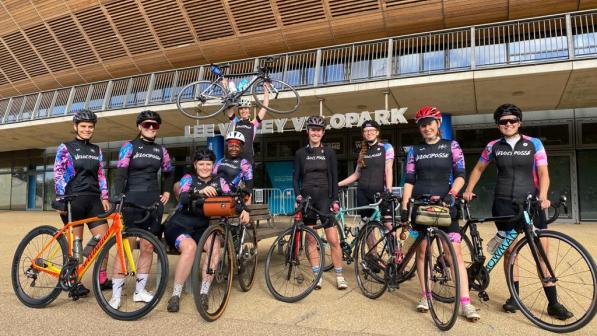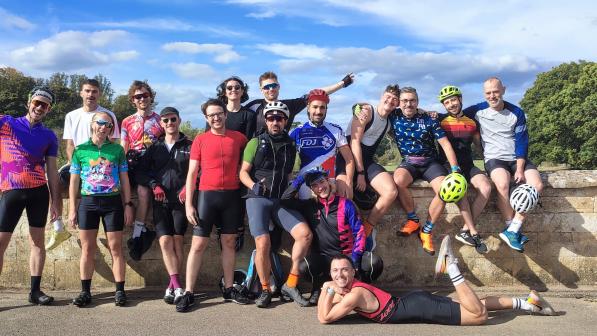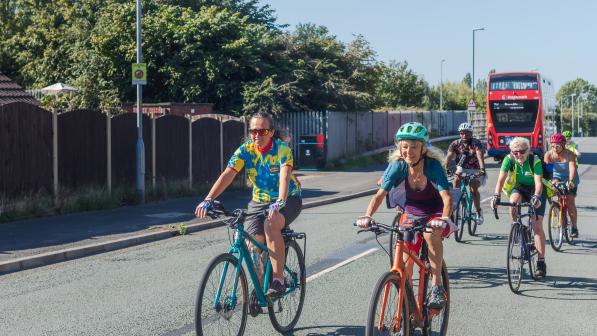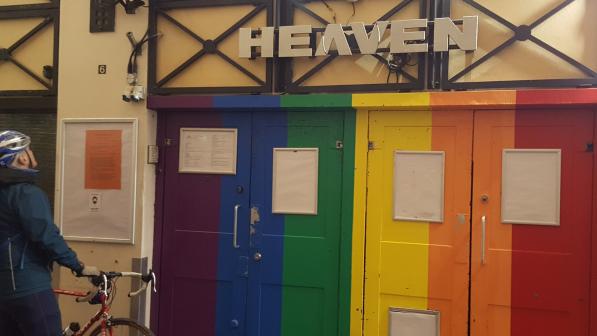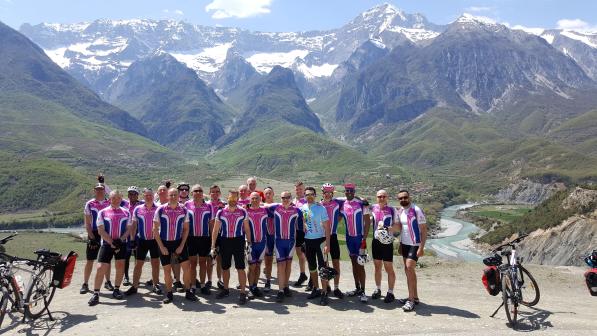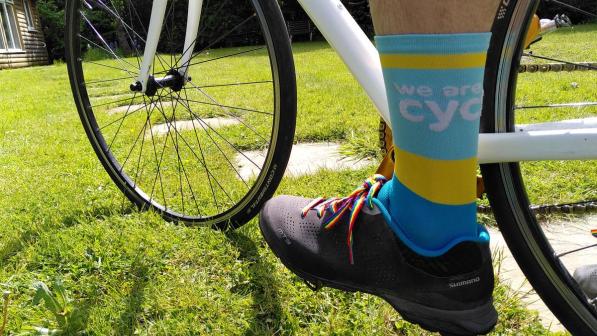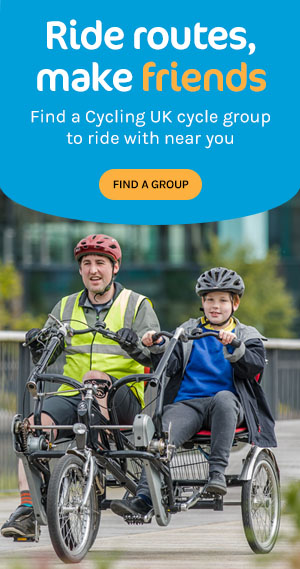How to be an LGBTQ+ friendly cycling group

A cycling group is much more than a bunch of strangers who ride together. It’s a community of welcoming individuals who have come together to share their love of cycling. It’s a place to make new friends, connect with others and explore the great outdoors.
One of Cycling UK’s five core values is ‘Cycling for all’. However, without a deliberate focus on diversity and inclusion, some people may feel less welcome in cycling groups than others. In 2020, three people told us this is why they started their own cycling groups with a specific focus on creating a positive experience for people from the LGBTQ+ community.
Bailey Lathrop of Cycling UK-affiliated group Velociposse said: “[The group] has given me the tools to hone my skills as a cyclist, as well as a safe and welcoming space to explore my identity.”
Positive actions
Your whole group will benefit from these positive actions. Existing members will feel more supported, and a more welcoming group will attract new – and more diverse – members. As well as increasing participation, these new members will bring fresh enthusiasm and energy.
Also, the more people feel at home within the group, the more likely they are to volunteer for it. More volunteers means more ride leaders and event helpers to share the load – and a more interesting and enriching experience for everyone.
Creating a more LGBTQ+ friendly space isn’t rocket science. There are several proactive steps your group can start taking today.
Use inclusive language
The language we use impacts how well we welcome others. It’s best to avoid using language that assumes someone’s gender or the gender of their partner. Changing how we speak does take constant consideration at first, but members of your group will quickly learn new habits.
The pronouns we use to identify someone, such as ‘he’ or ‘she’, often mean we are making assumptions about gender. A person’s gender is an important part of their identity and we should always refer to people using their preferred gender and pronouns. Listen out for how someone identifies themselves and follow suit. If you’re not sure, you can ask, or just use the inclusive ‘they’.

Aisling Gallagher, a member of Cycling UK-affiliated Velociposse CC, said: “Being in Velociposse means being in a club where I’m seen and recognised as a non-binary person in a world that often refuses to do that. Like a lot of non-binary people, I have to repeatedly come out and deal with misgendering in every aspect of my life.”
Accidentally using the wrong pronoun isn’t the end of the world, but deliberate or frequent misuse is considered abuse.
It’s important to our identities that people recognise and acknowledge our gender
Rosie Wilson, LGBTQ+ activist and Lunar Cycles Community Cycle Club volunteer
Rosie Wilson, an LGBTQ+ activist and Cycling UK Community Cycle Club volunteer, said: “It’s important to our identities that people recognise and acknowledge our gender – some of us have just taken our gender for granted and not thought about it before, and some of us actively don’t care what people think we are.
“Some of us specifically consider ourselves neither male nor female, which can be called ‘genderqueer’ or ‘non-binary’.
“For some of us, the concept of gender is a social construct that creates division and ought to be generally challenged.”
Challenge abusive behaviour
Phrases that refer to a gender stereotype, such as ‘man up’, are very harmful and have no place in a welcoming group. Derogatory language and slurs are damaging, even if it’s not aimed at anyone in particular.
Abusive behaviour should be challenged. Not all members will feel safe doing this directly, so everyone must have someone they can speak to in confidence.
Every group should have a safeguarding officer and an equity diversity and inclusion champion. Make sure the people carrying out these roles are easily identifiable and approachable. This will allow members to raise issues in confidence and help tackle problematic behaviour.
Zero tolerance on discrimination
Make sure there is no place for discrimination in your group. Only by creating a safe and supportive culture will everyone feel welcome.
If you haven’t already, your group should consider drafting an Inclusion Policy or Code of Conduct. These policies make your zero-tolerance approach clear and will provide a process to follow should any issues arise. Ensure the Code of Conduct is easy to find and refer to it regularly.

Make diversity and inclusion a priority
Appoint an equity diversity and inclusion champion to sit on your group’s committee. This person can help ensure the club stays committed to inclusion and openness.
They can help advise the committee and provide support to members. Anyone who’s passionate about diversity can take on this role.
Consider setting measurable goals on improving the diversity of your group. This will keep you accountable and actively working towards greater inclusion.
Treat people as individuals
We’re all different and have unique needs. Avoid grouping people together using generalised assumptions. Address someone’s needs on an individual basis and include them in the discussion. Remember that LGBTQ+ is an umbrella term, it doesn’t define someone.
Take a moment to consider how new members are welcomed when they first join the group. Take the time to speak to them directly and explain how the group works. It’s easy to feel like an outsider when you don’t know anyone. Buddy up newcomers with one or two members who can help show them the ropes.
Your work to create a safe and open space will allow everyone to speak up and share new ideas. These new ideas will help the group to evolve and flourish.
Consider the venues you visit
It’s never nice to feel unwelcome in a place you visit. Ensure that any cafés, or other establishments, you visit are LGBTQ+ friendly.
Spread the word
The way you outwardly promote your group impacts inclusivity. Try to use photos showing different types of people from all backgrounds. We all have different motivations so consider how your message comes across.
Positive messages and support for LGBTQ+ organisations and initiatives will tell the world you’re open to all. Something as simple as a pair of rainbow laces can instantly identify your group as a safe and welcoming space for members of the LGBTQ+ community.
Consider reaching out to other community groups. By linking up with other groups, even if they’re not cycling related, you can reach whole new audiences.
Running taster sessions or have-a-go events is a great way to get people along. Cycling can be daunting at first, especially if you’re not a regular cyclist. A dedicated introductory series or pathway will make your group far more accessible to all.

